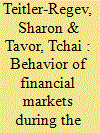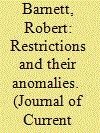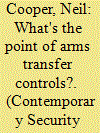| Srl | Item |
| 1 |
ID:
180047


|
|
|
|
|
| Summary/Abstract |
COVID-19 pandemic created a health emergency that led to a huge global economic crisis. This article examines the effects of a wide range of variables including the number of infections, deaths, and recoveries, as well as categorical variables like public behaviour and government restrictions on stock indexes on 16 different countries. It compares the situation in Israel with the other explored countries. The regression analysis revealed that while in Israel all the variables affected stock-index returns, in the other countries only a few of the variables did so.
|
|
|
|
|
|
|
|
|
|
|
|
|
|
|
|
| 2 |
ID:
148526


|
|
|
|
|
| Summary/Abstract |
Recent decisions under the UNCLOS dispute settlement regime, such as Chagos Archipelago, Arctic Sunrise and South China Sea, have had cause to consider the parameters of jurisdiction that exists under Part XV of UNCLOS. A determination of jurisdiction for any court or tribunal constituted under UNCLOS must have regard to alternative means of dispute settlement available, whether the dispute is one relating to the interpretation or application of UNCLOS and whether any exceptions to jurisdiction apply. This paper will consider these three dimensions in light of recent decisions and reflect on ways that the scope of jurisdiction is being expanded or restricted to resolve the disputes at issue.
|
|
|
|
|
|
|
|
|
|
|
|
|
|
|
|
| 3 |
ID:
118421


|
|
|
|
|
| Publication |
2012.
|
| Summary/Abstract |
In 1994, at a meeting known as the Third Forum on Tibet Work, the Chinese authorities announced a series of restrictions on religious practice in the Tibetan Autonomous Region. Described by many outsiders in terms of abuses of rights, in fact those measures differed in important ways. By analysing the target, rationale and procedure of these restrictions, it becomes clear that some were relatively routine, while others were anomalous - their purpose was not explained by officials, the source of their authority was not clear, or the restrictions were simply not admitted to at all. These anomalous orders can be linked to major changes in underlying discourses of modernization and development among officials in Tibet at the time. They reflected undeclared shifts in attitudes to religion and cultural difference, and seeded the dramatic worsening in state-society relations that has taken place in Tibetan areas since that time.
|
|
|
|
|
|
|
|
|
|
|
|
|
|
|
|
| 4 |
ID:
147428


|
|
|
|
|
| Summary/Abstract |
The Hukou system's restriction of Chinese internal migration is controversial. This paper models internal migration in a dual economy and assesses the social welfare consequences of the Hukou system. It contrasts the effects of absolute prohibition of migration with the mere exclusion of migrants from certain services such as health care and education. Asymmetries between the rural and urban sectors mean that optimality may require different levels of utility in the two sectors. The existence of a floating population, however, is inconsistent with an optimal labor allocation.
|
|
|
|
|
|
|
|
|
|
|
|
|
|
|
|
| 5 |
ID:
072630


|
|
|
|
|
| Publication |
2006.
|
| Summary/Abstract |
This essay examines the contemporary architecture of conventional arms transfer restrictions and concludes that it is deficient. In part this is simply due to the absence of political will to effectively implement existing arms transfer restraint. However, it is also the case that the globalization of the defense industry, the growing employment of dual-use technology and the pervasiveness and flexibility of illicit networks are, in combination, substantially eroding the utility of existing restrictions on arms circulation. It is argued, therefore, that such trends require a shift from a predominantly supplier-oriented model of restriction to a system of regulatory diffusion that matches the reality of arms diffusion in the international system. Such a system encompasses a variety of initiatives but particularly includes a greater emphasis on recipient initiatives, an enhanced role for civil society and the incorporation of an outputs/impacts model of arms regulation.
|
|
|
|
|
|
|
|
|
|
|
|
|
|
|
|